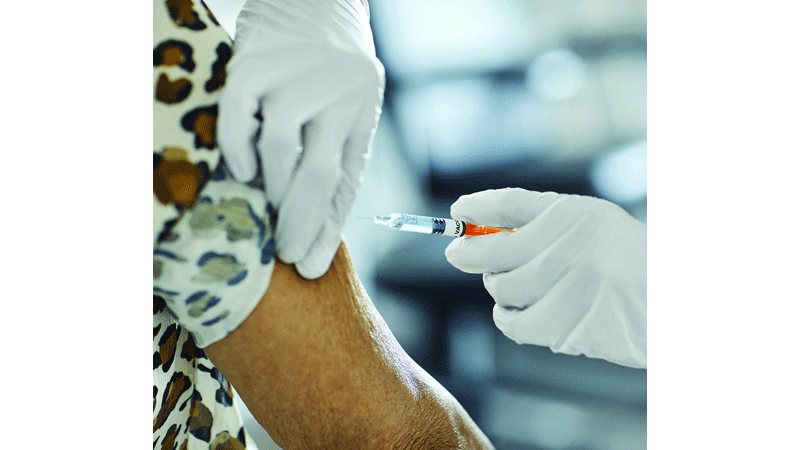FCPS board approves COVID testing mandates
Published 5:48 pm Tuesday, October 5, 2021
|
Getting your Trinity Audio player ready...
|
The Franklin City School Board voted 5-2 at its Sept. 16 meeting to require weekly or bi-weekly COVID-19 testing for all unvaccinated student-athletes, extracurricular activity participants, high-risk exposed employees and volunteers and all unvaccinated employees and auxiliary staff.
Those voting in opposition to these mandates were Ward 6 board member Jerry McCreary and Ward 5 board member Dr. Andrea Shelton.
These testing mandates were part of three recommendations made to the board by Franklin City Public Schools Superintendent Dr. Tamara Sterling at the conclusion of her presentation on testing and vaccines.
The three recommendations that the board voted on were as follows:
- Strongly encourage vaccinations for all student-athletes, extracurricular activity participants and high-risk exposed employees and volunteers, and if they do not opt to get the vaccine, then they will be required to submit to testing. Medical and religious vaccination exemptions will be granted on a case-by-case basis.
- Approve FCPS participation in the Virginia School Screening Testing for Assurance (ViSSTA) Program.
- Mandate weekly or bi-weekly testing for all unvaccinated employees and auxiliary staff (tutors, etc.).
Ward 1 board member Robert Holt asked how the school system evaluates and approves medical or religious exemptions, and Sterling said that the individual and their medical provider will provide a form indicating they cannot be vaccinated at this time due to whatever the reason may be, and this form will go directly to Human Resources. She said the process has similar confidentiality to that of the Family and Medical Leave Act.
“There are some people in the division that have expressed certain situations where they cannot (be vaccinated), and it’s completely understandable, and they will be approved not to have that,” she said. “They can’t get the vaccine, but we will encourage them to get COVID tested.”
“So if they have a medical exemption, they would have to be tested?” McCreary asked.
“Correct,” Sterling replied. “And that is for their safety and the safety of the children that they’re around, yes. And we don’t want to be abrasive, like, ‘OK, you’re going to be tested every week.’ That’s why we said between weekly or bi-weekly, but we have to take our employees into consideration, because I would hate to have a culture of, ‘OK, here you go, you’ve got to line up and get tested.’ We don’t want that at all. It’ll be random, it’ll be private.”
“What about the religious exemption?” McCreary asked. “How is that handled?”
“The religious exemption isn’t new, especially for our children and our adults,” Sterling said. “There are religious exemptions that we get for different things at school, curriculum, and they’re approved at the central office level, so they would be handled the same way. So they would either go to their clergy, the synagogue or whatever it is that we normally get and say that they’re not going to be vaccinated.”
“So it has to come through an organized religion?” McCreary asked.
“An entity, yes,” Sterling answered.
Establishing the context for her recommendations, Sterling started her Sept. 16 presentation by noting that since FCPS returned to in-person learning Sept. 1, the school division had 16 confirmed COVID cases.
“Many of the cases were contact traced back to student-athletes and students who have been in close contact with someone in the home or at an event,” she said. Referring to some Franklin COVID health metrics data, she added, “The reason why this recommendation is coming before the board (is) because (Franklin) has been on severe levels for the past couple of weeks, and we cannot ignore the data transmission in our town. Our town is a small town, but to be at severe levels, that’s very concerning.”
Sterling also shared results from the FCPS Employee Vaccination Survey. Out of 205 school division employees, 137 employees had reported that they had received both their first and second vaccine shots, and 68 employees either had not responded or were unvaccinated.
Part of Sterling’s presentation was also spent introducing board members to ViSSTA, which is a K-12 COVID-19 voluntary testing program in which a third party will come to schools to conduct testing. Schools may opt in to this program as an additional layer of protection. Since it is voluntary, schools must have a consent form on file for any individual tested.
The Centers for Disease Control and Prevention note that fully vaccinated individuals may be excluded from screening testing although vaccinated individuals may opt to participate in the ViSSTA program, Sterling stated, noting that school administration would love for students to be both vaccinated and tested.
She said she believes funding for ViSSTA will last for two years.





